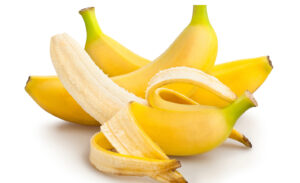Go bananas!
World’s most popular fruit is really good for you
 There are a bunch of reasons to like bananas. Other than being rich in vitamin B6, bananas are a good source of vitamin C, dietary fiber and manganese. Bananas are also fat-free, cholesterol-free and virtually sodium-free. So what do these mean for your health?
There are a bunch of reasons to like bananas. Other than being rich in vitamin B6, bananas are a good source of vitamin C, dietary fiber and manganese. Bananas are also fat-free, cholesterol-free and virtually sodium-free. So what do these mean for your health?
“They’re rich in nutrients and fiber,” said Colleen Spees, associate professor of medical dietetics at Ohio State University Medical Center in Columbus. “They’re delicious. They’re inexpensive. They’re all the right things.”
They’re the world’s most popular fruit and have been cultivated for perhaps 10,000 years. Some scholars think the tempting fruit in the Biblical Garden of Eden sounds more like a banana than an apple. Bananas turn up in religious traditions from around the world.
Banana trees are actually herbs, and the fruit is technically a berry. A “bunch” refers to the cluster of bananas as harvested. A small cluster of bananas is a “hand,” and an individual banana is a “finger.”
A SOURCE OF POTASSIUM
Whatever you call them, bananas are noted for being a good source of potassium, Spees said. According to the U.S. Department of Agriculture, one medium banana provides 375 milligrams. That’s about 11 percent of the recommended daily potassium for a man and 16 percent for a woman.
“Potassium is a mineral that is vital for heart health, especially in terms of blood pressure management,” Spees said. (It’s true other foods – including lima beans and beet greens – are higher in potassium, she said, “but how many people are eating the greens of beets?”) Bananas also are a source of magnesium (32 milligams), beneficial phytochemicals and antioxidants.
One medium banana, which contains 113 calories, also has about five grams of total dietary fiber, which helps people feel full. And the fiber in bananas has “really interesting” qualities, Spees said.
GOOD FOR YOUR GUT
Unripe and slightly unripe bananas contain resistant starch, which serves as prebiotic fiber. These indigestible prebiotics serve as food for probiotics, the “good” microbes that live in the gut. These beneficial gut bacteria are essential for digestion and have been linked to immunity, brain health and more.
As a banana ripens, the resistant starch is broken down into natural sugars, Spees said. “That’s why a riper banana is a little bit sweeter than a slightly unripe banana.”
Certain special situations call for caution, she said. Although bananas, like most fruit, can be part of a healthy dietary pattern for people with uncontrolled diabetes, a medium banana has about 26 grams of carbohydrates, which must be a consideration for people on strict diets.
What’s problematic, though, is to assume slipping them into a banana split or banana bread makes those desserts healthy, she said. The same can be said for banana chips.
“Most banana chips are actually dried and fried,” Spees said. “And some of them are coated with either an oil or a syrup that then contributes a significant source of added sugars, calories and fats.”
But bananas work well at thickening and sweetening smoothies, Spees said. “If you’re mixing a frozen banana with, say, Greek yogurt, frozen berries and other healthy ingredients, that’s great.”
Part of the banana’s beauty, she said, is its convenience. In the morning, it can be sliced and added to cereal. Later, it’s a great snack. Some people enjoy bananas with nut butters or mixed with yogurt. Elvis loved peanut butter and banana sandwiches. So at the end of the day, feel free to go bananas. They’re good for you.



Leave a Reply